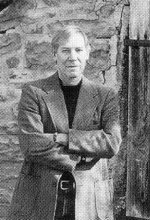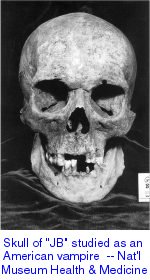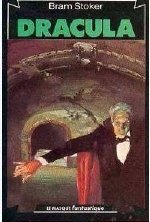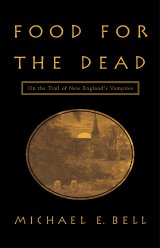| Real Vampires in New England? |

Did Our Ancestors Consume Corpses
to Cure Disease?
Bella Lugosi beware! it’s Bell versus Bella. Folklorist Michael E. Bell suggests that our local ancestors unearthed loved ones in a desperate effort to cure tuberculosis. This New England tour of vampire sites focuses on his native Rhode Island, but includes a recently discovered New Hampshire case as well.
Interview with a REAL Vampire Stalker
Our exclusive interview with the author of "Food for the Dead: On the Trail of New England Vampires". Author and folklorist Michael E. Bell, who has a Ph.D. in folklore, has been consultant to the Rhode Island Historical Preservation & Heritage Commission since 1980. SeacoastNH.com editor J. Dennis Robinson interviewed the vampire stalker and filed this eerie report.
SEACOASTNH.com
Your study offers a wholly new definition of vampires, far from the familiar Hollywood lexicon. What exactly did our New England ancestors do with the exhumed bodies of their relatives and why?
MICHAEL E. BELL:
 When consumption (which is what people used to call tuberculosis that settled in the lungs) took hold in a family, some people in the outlying areas of New England would open the graves of their deceased relatives, looking for signs that they considered out of the ordinary -- such as liquid or "fresh" blood in the heart. The heart would be cut from the body and burned to ashes. Often the ashes were administered, in water or some medicine, to sick family members. The belief supporting these practices seemed to be that there was some sort of evil, perhaps a demon, residing in one of the bodies that was draining the life from others in the family.
When consumption (which is what people used to call tuberculosis that settled in the lungs) took hold in a family, some people in the outlying areas of New England would open the graves of their deceased relatives, looking for signs that they considered out of the ordinary -- such as liquid or "fresh" blood in the heart. The heart would be cut from the body and burned to ashes. Often the ashes were administered, in water or some medicine, to sick family members. The belief supporting these practices seemed to be that there was some sort of evil, perhaps a demon, residing in one of the bodies that was draining the life from others in the family.
SEACOASTNH.COM:
Is this really vampirism, or something else entirely?
MICHAEL E. BELL:
The procedures are identical to those practiced in Eastern Europe, particularly Romania. In New England, the people involved never referred to their relatives as vampires. Most of them probably had never even heard of vampires. It was outsiders who recognized the practice as vampirism and labeled it so.
SEACOASTNH.COM:
You're from Rhode Island, home of Mercy Brown. Is that the story that got you started?
Yes, it was a descendent of the Brown family who shared his family's story with me that got me following the vampire trail. His story was that people in the family were dying of some mysterious disease and nothing that they tried could stop it from spreading. So the remaining men of the family got together and decided they had to go to the cemetery and exhume the body of Mercy, the last to die. When they uncovered her, they saw that she had turned over in the grave, and they found fresh blood in her heart. They cut out her heart and burned it on a nearby rock and fed the ashes to her sick brother, Edwin. Although Edwin died two months later, no one else became ill. So the family believed that had taken care of the problem.
SEACOASTNH.COM:
And what did you find nearby in New Hampshire?
MICHAEL E. BELL:
A Freewill Baptist Minister who kept a journal from 1810 to 1865 described an exhumation he had witnessed in 1810 in Barnstead, New Hampshire. A man named Denitt was dying of consumption, so people in the community went to the graveyard and dug up the body of his dead daughter, Janey Denitt. In this case, they "had a desire to see if anything had grown upon her stomach," according to the journal entry, "but found nothing as they supposed they should." The next day, the minister, Rev. Place, went to Loudon where the people told him of a similar incident that had occurred among the Shakers several years earlier.
SEACOASTNH.COM:
Can you tell us what conclusions 20 years of vampire stalking research have led you to?
MICHAEL E. BELL:
I believe that this practice was probably much more prevalent and widespread than we might think. The few cases I've found are just the tip of the iceberg. I think that this practice reveals how people deal with looming death that is considered untimely or premature -- they will not accept it without putting up a fight. If the medical profession says, "I can't help you," then people will look elsewhere for an answer. And folklore always has an answer. It may not be an effective answer, but in the end, even a wrong answer is better than none. Doing something beats doing nothing.
CONTINUE vampire interview with Michael E. Bell
Interview with a Vampire Stalker (continued)
SEACOASTNH.COM:
We're immersed in popular vampire fiction from Bram Stoker to Anne Rice and Stephen King. We have Buffy the Vampire Slayer in prime time, even "The Count" on Sesame Street and Count Chocula cereal for kids. Why this popular fascination with the legends of blood-sucking humans?
MICHAEL E. BELL:
 Death has always been the great human mystery. It seems that we humans are the only organism that is aware of our utlimate earthly fate, which is, of course, death. The enigma of death attracts our attention, and any creature that apparently cheats the grim reaper, such as the undead vampire, will be endlessly fascinating. The Hollywood vampire has the added appear of being romantic, even sexy, as well as being all-powerful and immortal. What could be more appealing that?
Death has always been the great human mystery. It seems that we humans are the only organism that is aware of our utlimate earthly fate, which is, of course, death. The enigma of death attracts our attention, and any creature that apparently cheats the grim reaper, such as the undead vampire, will be endlessly fascinating. The Hollywood vampire has the added appear of being romantic, even sexy, as well as being all-powerful and immortal. What could be more appealing that?
SEACOASTNH.COM:
Aren't you a little concerned about the cult of "believers" who seem to take the vampire and other fictions seriously? Or as a folklorist, do you see their of acceptance of stories beyond science as a healthy thing?
MICHAEL E. BELL:
It's hard to know how seriously some folks take their vampires. I think most of us have fun with vampires, and that's OK as long we keep our sense of rationality and logic. When people start actually drinking other peoples' blood or exhuming corpses in cemeteries, things have gone beyond reason. Life (and death) holds many mysteries and it is natural and healthy for us to wonder and speculate, and even to believe things that we cannot know or prove. But if acting on those beliefs puts us and others in real danger, it's time to step back and reconsider.
SEACOASTNH.COM:
As a professional researcher and scholar, your approach is scientific. But how do academics respond to your choice of topic?
MICHAEL E. BELL:
My fellow folklorists don't have a problem with one of their colleagues interpreting vampire traditions. Actually, the subject of vampires and other "revenants" -- those who return from the dead -- is pretty mainstream folklore material. But I think scholars from other disciplines, such as history, often see such topics as frivolous and tend to dismiss a book like mine without bothering to actually open it up and read it. Even scholars have a hard time breaking through the Count Dracula/Bela Lugosi stereotype. If academics take the trouble to look closely, they may be pleasantly surprised at what can learned about humanity by examining peoples' authentic folk practices.

SEACOASTNH.COM:
By offering an historical rationale for vampirism, don't you also annoy the legend-mongers, who accept the fictional view? Are they disappointed or angered by your factual debunking of popular legends?
MICHAEL E. BELL:
Sometimes, after I've discussed this vampire tradition, a person will express disappointment that I've destroyed his or her image of vampires. I'm no longer apologetic about this because the fictional vampire is really such a thin, watery figure when compared to the rich and varied vampires of folklore and history. The real vampires are much more frightening, in my opinion.
SEACOASTNH.COM:
More frightening? How so?
MICHAEL E. BELL:
I guess, fundamentally, it's because what you DON'T see is more threatening than what you do see. When we have an image of evil, we can objectify it and find a way to deal with it. But the New England vampires were never said to leave their graves. They killed their kin while still lying, apparently dead, inside their coffins. How can you escape from something like that? That thought always sends a chill down my spine.
SEACOASTNH.COM:
Point taken. The idea of exhuming one's own relative and cutting out the heart of the corpse seems beyond imagination today, especially with our modern sterile funeral techniques. You really think this practice was common among our New England ancestors?
MICHAEL E. BELL:
As I mentioned earlier, I think that there is a definite cultural pattern that was more prevalent than we might think -- or might want to think. In my view, the New England vampire tradition was basically a folk medical practice -- a desperate, final hope to save the lives of people who were loved, but whom medical science had deemed were doomed to die. Would someone relish the thought of mutilating the bodies of his wife and children? Of course not. So, they must have been driven to the brink of despair. They were just like us. What they lacked was the knowledge and understanding of how to treat tuberculosis.
SEACOASTNH.COM:
Aren't you really telling us about folk medicine? Is there any evidence.that these ghoulish practices worked, or provided some relief to the.afflicted?
MICHAEL E. BELL:
You know, research has shown that even when disease is untreated, many people survive. So it was with this practice -- some people lived afterwards and others died. I think the actual healing took place in the family and community. Even if the patient died, there was closure and a sense that everything that could have been done to stop the disease was done.
SEACOASTNH.COM:
Both your research and the vampire legends seem to focus ultimately on human fear -- and the lengths we will go to quell it. The current anthrax scare, for example, gives us just a hint of how we might respond as a society to a deadly invisible disease. Our ancestors used legends and folklore to explain away their fears, but what happens to a scientific society that believes there is a rational answer to everything?
MICHAEL E. BELL:
We go out and buy gas masks, antibiotics and bioterrorist kits --even though the experts tell us that these things will not prevent us from getting anthrax. Just because we have science to explain what anthrax is and how it works, doesn't make us any more intelligent or logical than our ancestors who dug up the bodies of their relatives. And wearing a gas mask is probably just as effective as consuming the ashes of a burned heart.
SEACOASTNH.COM:
Where from here? Will you take this show on the road, or do you have another project in the works?
MICHAEL E. BELL:
As far as I'm concerned, there are many vampire trails still not followed or completed. I have a feeling that I will be collecting more examples, and perhaps filling in information on some of the sketchy cases I've already found. I have other projects, from documenting the folklife of the shellfishing industry of Narragansett Bay to interpreting African-American voodoo practices, but, as it has been for the past 20 years, the New England vampire tradition will still attract my attention and hold my interest..
SEACOASTNH.COM:
Thanks for your time, Michael
MICHAEL E. BELL:
Thank you.
Copyright © 2005 by SeacoastNH.com. All rights reserved. Originally appeared online here in 2001.

